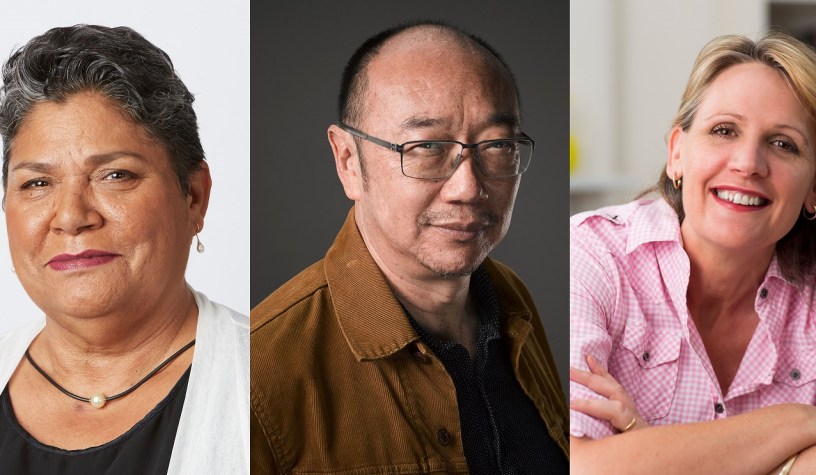First Nations media executive Dot West, late writer/director Shirley Barrett, and showrunner, writer, and director Tony Ayres have received honorary degrees from the Australian Film Television and Radio School (AFTRS).
Each was awarded a Doctor of Arts, Film and Television at AFTRS’ annual graduation ceremony held last Friday, which saw 141 students graduate from the 2022 academic year.
AFTRS CEO Nell Greenwood said this year’s event held special significance, given the institution’s 50-year milestone in 2023.
“Graduation is always a significant and very proud moment in the AFTRS year as we celebrate the talent and hard work of our graduating students,” she said.
“In the school’s 50th anniversary year, it’s been a particularly joyful event as we reflect on the school’s long history of excellence in creative education and the strength, generosity, and brilliance of the AFTRS alum community that these new graduates have just joined.”
West started her media career in radio in 1987, before moving into to the screen industry and spending a decade as head of productions at Goolarri Media in Broome, where she oversaw radio, television, music, and events operations.
The scriptwriter, story advisor, and accredited trainer serves as director of Goolarri Media Enterprises and Ramu Productions in Broome, and is also a board member of CinefestOz and chairperson of the First Nations Digital Inclusion Advisory Group. Since 2014, West has co-facilitated the Goolarri Writers Program, designed to support emerging Indigenous writers.
The Noongar woman said she was “honoured” to be recognised by an institution that “for the last 50 years, has supported the growth and development of our creative industry to become the revolutionary force it is today for Australia and the world.”
Barrett is known for her work across TV and film, with directing credits including Boys From the Bush, Heartbreak High, Police Rescue, Packed to the Rafters, Wild Boys, House Husbands, Mr & Mrs Murder, Love Child, Winter, A Place to Call Home, Offspring, on which she was also a writer, Home & Away, and Five Bedrooms. She also wrote and directed feature films Love Serenade, Walk the Talk, and South Solitary.
With the screenwriter, director, and novelist having died last August after succumbing to metastatic breast cancer, her husband Chris Norris accepted her posthumous honorary degree.
In paying tribute to his wife, an AFTRS alum whom he met when they were both 19, Norris said the institution had helped develop her “unique voice”.
“She often spoke of what a privilege it was to have the opportunity to play and experiment in an environment that was so well-resourced, supportive, and unrestrictive,” he said.
“Her final year film, Cherith, which she wrote and directed, gave her the confidence and resolve to follow a creative path that was her own. Her distinctive comedic style was piercingly funny but always compassionate.
“As the years went on I marvelled at what a determined, disciplined, and uncompromising artist she was, but also an inclusive and generous collaborator. It was these qualities that made her greatly loved and highly regarded in the Australian film and television industry. That and the fact that she was so much fun to be around.”
Also recognised for his contribution across film and television was Ayres, an award-winning showrunner, writer, and director, who was one of the founding members of Matchbox Pictures. In 2018, he established his own production company Tony Ayres Productions (TAP), developing and producing feature films and television for global audiences and international marketplaces.
Ayres was the creator/showrunner on The Slap, Nowhere Boys and global number one Netflix hit, Clickbait. He co-created and was an executive producer on Glitch, Stateless, and Fires, and has also executive produced titles such as Barracuda, Seven Types of Ambiguity, Wanted, Creamerie, The Devil’s Playground, Old School, Underground: The Julian Assange Story, The Straits, and The Family Law. His feature film work has included directing Cut Snake, The Home Song Stories, and Walking on Water, as well as executive producing Ali’s Wedding and Lou.
In receiving his degree, Ayres reflected on his time as a student of the school in 1989 when he was “very uncertain about whether I belonged in the screen industries or not”.
“It was the inspiration and guidance of key teachers there, in particular, Barbara Masel, which set me on the course that sees me still in this industry thirty-four years later,” he said.
“For me, the idea of revolutionary screen content is finding the courage to say what is not being said, to be additive to the current cultural conversation, and to humanise polarising debates.”
Also announced at the Graduation ceremony was the winner of the inaugural Women in Cinematography Prize, presented by Sony to AFTRS graduate Grace Clinton.
The ceremony came three days after the Federal Budget announcement, in which AFTRS receiveD an additional appropriation of $500,000 to support course offerings and upgrade facilities.
Speaking at the ceremony, Arts Minister Tony Burke emphasised the importance of fromal training to the students.
“The reason we have a cultural policy isn’t a set of arts announcements, we have a cultural policy because the work you’ve now been trained to do as graduates is essential for Australians to know themselves, for us to understand each other and for the world to come to know us,” he said.
Preceding graduation, AFTRS held its annual First Nations graduation event to acknowledge the dedication and hard work of First Nations students.


